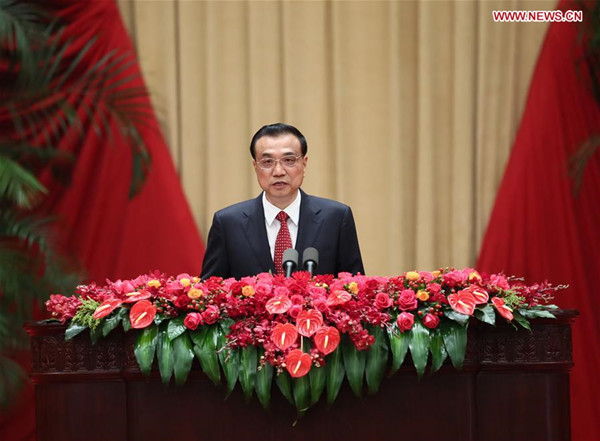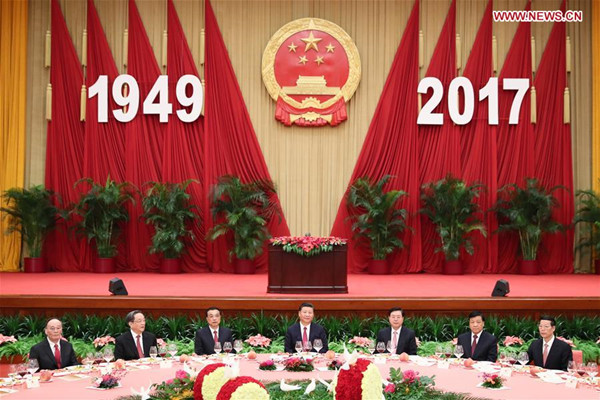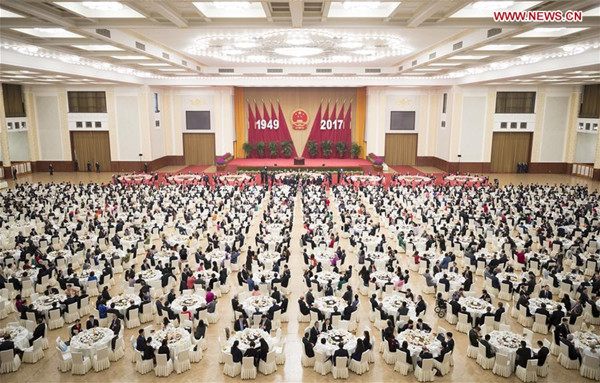China’s national anthem law takes effect
[unable to retrieve full-text content]China’s National Anthem Law came into force Sunday to ensure appropriate performance of the song.
[unable to retrieve full-text content]China’s National Anthem Law came into force Sunday to ensure appropriate performance of the song.
Compared with the delegates to the 18th National Congress of the Communist Party of China (CPC), more CPC members from frontline production and women have been elected as delegates to the 19th congress.
|
|
|
Graphics shows that delegates to the 19th National Congress of the Communist Party of China (CPC) feature more workers and women, according to a statement by the CPC Central Committee’s organization department Saturday. (Xinhua/Ma Yan) |
According to a statement by the CPC Central Committee’s organization department Saturday, a total of 771 delegates, or 33.7 percent of the total, are from frontline production and manufacturing, an increase of 3.2 percentage points compared with the 18th congress five years ago.
Among them, 198 are workers or migrant workers, 86 are farmers and 283 are professional technical personnel, it said.
The representation of female CPC members and members from ethnic minority groups are also rising, reaching 24.1 percent and 11.5 percent of the total respectively, the statement said, noting that ethnic minority members come from 43 out of the country’s 55 ethnic minority groups.
The statement also noted that the election of the delegates was conducted in adherence to strict standards regarding political integrity and clean work styles and that 27 people, including Sun Zhengcai, former Chongqing Party chief, and Mo Jiancheng, a former senior official with the Ministry of Finance, have been disqualified during the process.
A total of 2,287 delegates have been elected to attend the congress, to be held in Beijing from Oct. 18.
The delegates, who were elected from across the country when local CPC committees held their congresses this year, will need to pass a further check to get final approval to attend the congress.
The delegates were elected in accordance with the Party constitution and CPC Central Committee requirements, the statement said.
The average age of the delegates is 51.8, about 0.2 year younger compared with the 18th congress, and about 70.6 percent of them are under the age of 55, according to Saturday’s statement.
The statement said 2009 delegates, or 87.8 percent of the total, joined the CPC after December 1978 and 416 of them joined the Party after January 2000, a fact indicating that the Party spirit is passing on to younger generations.
Strict procedures were observed all through the process, from the nomination and candidate selection to the organizational review and election.
Grassroots CPC members have shown enthusiasm and fully expressed their will in the election and the delegates elected are outstanding representatives of CPC members from various sectors and social spectra.
Various measures were also taken to ensure Party members in remote areas and those engaged in field work participated in the election, the statement said, noting that the average participation rate has reached 99.2 percent.
It also stressed that the election was a competitive one, and more than 15 percent of the preliminary nominees had been eliminated during the process.
According to convention, some retired CPC members will also attend the 19th CPC National Congress as specially invited delegates, the statement said.
China will open wider to create and share development opportunities with other countries, Premier Li Keqiang said in Beijing on Saturday.
 |
|
Chinese Premier Li Keqiang addresses a reception held by the State Council to celebrate the 68th anniversary of the founding of the People’s Republic of China, in Beijing, capital of China, Sept. 30, 2017. (Xinhua/Lan Hongguang) |
Li made the remarks one day ahead of China’s National Day on Oct. 1, when addressing a reception at the Great Hall of the People.
Chinese President Xi Jinping, together with other senior leaders including Zhang Dejiang, Yu Zhengsheng, Liu Yunshan, Wang Qishan and Zhang Gaoli, as well as some 1,200 people from home and abroad attended the reception.
China will make new contributions to global governance and the promotion of world peace and development, said Li.
Li summarized the major events in 2017 and highlighted the improvement in economic structure, drop in overcapacity and booming entrepreneurial and innovation activities.
 |
|
Chinese President Xi Jinping (C), Premier Li Keqiang (3rd L), and other senior leaders Zhang Dejiang (3rd R), Yu Zhengsheng (2nd L), Liu Yunshan (2nd R), Wang Qishan (1st L) and Zhang Gaoli (1st R) attend a reception held by the State Council to celebrate the 68th anniversary of the founding of the People’s Republic of China, in Beijing, capital of China, Sept. 30, 2017. (Xinhua/Lan Hongguang) |
“All these are testimony to the great vitality, potential and resilience of the Chinese economy,” said Li.
Looking forward, he said China will work to maintain steady and sound economic development, strive for greater social progress and deliver an ever better life to the people.
“We will ensure that people’s essential needs are well met, and that our people will have fewer worries and complaints and lead a more fulfilling and happier life,” Li said.
Li also reiterated the “one country, two systems” policy in Hong Kong and Macao affairs.
Regarding ties across the Taiwan Strait, Li said the Chinese mainland will continue to uphold the one-China principle and the 1992 Consensus as the political foundation, and firmly oppose “Taiwan independence.”
 |
|
A reception is held by the State Council to celebrate the 68th anniversary of the founding of the People’s Republic of China, in Beijing, capital of China, Sept. 30, 2017. (Xinhua/Ding Haitao) |
“[We will] work with our compatriots on Taiwan and all those who support the peaceful development of cross-Straits relations to move toward the complete reunification of the motherland,” said Li.
Video courtesy of CGTN
At day break, more than 115,000 people from across China gathered at the Tian’anmen Square at the heart of Beijing to watch the raising of the National Flag.
Sunday marked the 68th anniversary of the founding of People’s Republic of China.
|
|
|
A national flag-raising ceremony is held at the Tian’anmen Square in Beijing, capital of China, Oct. 1, 2017. People from across the country gathered at the square to watch the national flag-raising ceremony on the morning, marking the 68th anniversary of the founding of the People’s Republic of China. (Xinhua/Luo Xiaoguang) |
At 6:07 a.m., the national flag was escorted by guards into the square. The crowd stood in silent as the national anthem “March of the Volunteers” was played, and the five-star national flag was raised. When the flag spread out at the top of the flagpole, 10,000 Peace Doves were released into the sky.
At the backdrop was a 17-meter-tall giant display in the shape of a floral basket, which holds flowers and fruits such as persimmons, pomegranates, apples, peonies and Chinese roses. It symbolizes a thriving and prosperous country.
Watching the national flag raising ceremony at the Tian’anmen Square has been a way of Chinese celebrating the National Day. Some joined the gathering for sightseeing, and others came to express the feeling of patriotism.
“We really got emotional when we sang the national anthem on this occasion,” said Yang Yuanyang, a freshman from the Beijing Information Science and Technology University.
According to China’s national anthem law which took effect on Sunday, the national anthem can only be allowed at formal political gatherings, including flag raising ceremonies and major celebrations.
The National Day is celebrated with a week-long holiday, while the Chinese traditional Mid-Autumn Festival or Moon Cake Festival,featuring family gathering, falls on Oct. 4 this year.
Major parks in Beijing have been decorated with around 1.6 million potted flowers of 150 different species, according to Beijing Municipal Administration Center of Parks.
Traffic information from the Ministry of Transport showed that traffic on highways in Beijing, Tianjin and Shanghai became heavy from 6 a.m. on Sunday morning, as holiday goers rushed to scenic spots.
On Sunday, the scenic area of the landmark Badaling section of the Great Wall in northern Beijing was opened earlier than normal days to welcome holiday tourists.
Badaling, where the oldest sections of the Great Wall have been dated back to the Northern Qi Dynasty (550 – 557), is decorated with over 100,000 flowerpots to add the festive air for the National Day.
The ancient Beijing-Hangzhou Grand Canal opened its first transport hub on Sunday, marking the start of a modern transport era on the 2,500-km manmade waterway, the longest in the world.
With the hub in operation in Hangzhou, capital of east China’s Zhejiang Province, passengers can travel by boat for sightseeing on the Grand Canal and conveniently transfer from water traffic to other road transport means.
Over 1,000 km of the Grand Canal has been recognized as a world heritage site in 2014.
China on Saturday released guidelines on green development in agriculture, setting goals for resource conservation and environmental protection.
The guidelines were published by the General Office of the Communist Party of China Central Committee and the General Office of the State Council.
The country should maintain the area of arable land and prevent the land quality from worsening, according to the guidelines.
By 2020, farmland quality should be improved by 0.5 grade on average, while the total arable land area should be no less than 124 million hectares.
China grades its farmland quality on a scale of one to ten.
The government aims to prevent excessive exploitation of groundwater and improve the efficiency of irrigation.
The document set the target of zero growth in the amount of chemical fertilizers and pesticides used in major crops by 2020. Forest coverage is to exceed 23 percent.
The comprehensive production capacity of grains should be stabilized at or above 550 million tonnes by 2020, with the quality of farm produce markedly improved.
Straw, animal waste and agricultural plastic film should be fully utilized, according to the guidelines.
The agricultural sector remains resource-intensive, with pollution and ecological degradation yet to be contained, while the supply of high-quality and green farm produce cannot satisfy growing demand, the document said. Agriculture should be more sustainable, farmers better off, and the countryside more beautiful and liveable.